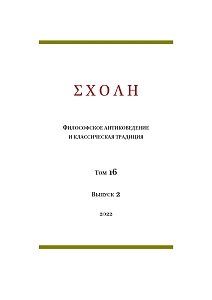Антиковедение как философия культуры: Фаддей Зелинский и Карл Кереньи
Classical Studies as Cultural Philosophy: Tadeusz Zielinski and Karl Kerényi
Author(s): Valery V. PetroffSubject(s): Philosophy, Cultural history, Recent History (1900 till today), Russian Literature, 18th Century, 19th Century, Philology, British Literature, Sociology of Literature
Published by: Новосибирский государственный университет
Keywords: Tadeusz Zielinski; Karl Kerényi; Vyacheslav Ivanov; Friedrich Nietzsche; Hippolyte Taine; Friedrich Paulsen; U. von Wilamowitz-Moellendorff; classical studies; Renaissance;
Summary/Abstract: The article discusses the concept of three “Renaissances”, as outlined by Tadeusz Zielinski in the essay “The Ancient World in the Poetry of Apollon Maykov" (1899). By “Renaissances” Zielinski meant the periodic appeals of a particular European culture to the ancient legacy and, at the same time, the beneficial cultural consequences of such appeals. According to Zielinski, two renaissances of antiquity have already taken place: the “Italian” and the “Germanic” (in the 18th–19th centuries); the next should be the “Slavonic” Renaissance. The object of attention is the imagery of Zielinski, who compares the influence of antiquity on new cultures with an oceanic flow that carries the heat of the south to the cold shores of northern Europe. It is shown that Zielinski is influenced by his immediate sources — the cultural and philosophical constructions of Hippolyte Taine and Friedrich Paulsen. It is argued that Paulsen’s text depends on Taine’s, and Zielinski uses them both. The corresponding views of Russian philologists and philosophers, who shared Zielinski’s concept, are considered. On the example of the “Hungarian” works of Karl Kerényi of the 1930s, it is shown that the belief in the beneficence and the need for the revival of antiquity for national culture was not an exclusively Russian phenomenon, but was a basic ideological archetype of the international community of European classical philologists and scholars of the first half of the 20th century.
Journal: ΣΧΟΛΗ. Философское антиковедение и классическая традиция
- Issue Year: XVI/2022
- Issue No: 2
- Page Range: 814-840
- Page Count: 27
- Language: Russian

